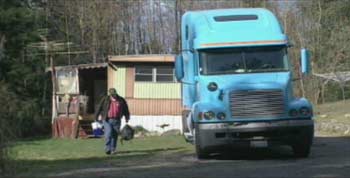
Three years into his retirement, Pat O'Neill has reentered the workforce.
When Pat O'Neill retired from his job as a mechanic with United Airlines in 2003 at age 55, he thought his lifetime pension would allow him and his wife Connie to travel the country in their motor home. "Checks would come every month, we'd be able to just kick back, enjoy life, … spend quality time with each other," he says.
But today, three years into his "retirement," Pat O'Neill sees the country from a different driver's seat. Five days a week he is on the road -- alone -- driving a truck to pay for health care and other basic expenses. Just months after he retired, United declared bankruptcy and dumped its pension plans on the Pension Benefit Guaranty Corporation (PBGC). PBGC only insures pension up to a maximum amount set by Congress, so O'Neill lost $937 of his promised $3,000 monthly pension. United also raised monthly health care premiums from $22 to $182.
"There's nothing else I can do. I'm limited as to the amount of money I can make," he says, "So I guess I'll be driving a truck for a while." Pat O'Neill is one of many retirees who are finding that the reward at the end of a long career is just more years of work.
When he joined United as a mechanic in 1967, O'Neill thought he'd found an employer who could ensure a middle-class life for him and his growing family. "I always thought I was doing quite well working for United," he says. "I had a work ethic, and I was very loyal to the company."
Because usually worked the night shift -- when most airplanes are repaired -- he saw less of his wife and children than he would have liked, but he looked forward to a secure retirement. "I figured I'd work until 60, 65, and I'd go ahead and get whatever I had coming to me," says O'Neill. "The bottom line is you just went to work every day and did your job, and you figured it was all going to come together."
Loyal to his employer, O'Neill also bought 1,500 shares of United stock through the airline's Employee Stock Ownership Plan (ESOP), a program the company offered its unions in exchange for wage and benefits concessions. Most financial advisers -- including O'Neill's -- warn against investing too heavily in one's employer's stock, but he thought it was a good investment. In the late '90s, when O'Neill bought in, United's stock was trading around $100 a share.
Not long before O'Neill retired, United fell on hard times. The airline lost two of its planes in the 9/11 terrorist attack; the drop in air travel, rising fuel prices and stiff competition from budget carriers made matters worse. In December 2002, United sought Chapter 11 bankruptcy protection in an attempt to restructure the company. Soon they were laying off workers and moving some maintenance oversees.
O'Neill says United encouraged him to retire. "They said -- they never put it in writing -- 'If you guys want to get out and save your medical insurance or your retirement, it might be a good time to think about leaving,'" he recalls. "I thought, 'Well, I've got 35 years. I'll let the younger guys go ahead and have a job because I've done my time.'"
Then came the news of a reduced pension and rising health care costs. And bankruptcy had wiped out the value of O'Neill's United shares; by December 2002, the stock had fallen to just $1.00 a share. About 11 months after the company filed for Chapter 11, O'Neill cashed out his United stock, afraid its value would fall even further. "We got a check for $1,800," he says. "We got hit with a double whammy. We lost on ESOP. We lost on our retirement."
Faced with a reduced pension, higher costs and no stock windfall, O'Neill had no choice but to return to work. "I made up my mind years and years ago that once I left United Airlines, I didn't want to have to go out and have to work another job until I was 70," he says.
Unable to return to his well-paying job as an airline mechanic, he has taken a job as a truck driver, along with a substantial cut in pay. He has no idea of when he'll be able to retire -- again. "I've learned one thing," he says. "You don't get rich driving a truck."
To save money, he sleeps in the cab of the truck and packs all his own food in a cooler. But at 58, he finds the career change stressful: It keeps him on the road 11 hours a day, five days a week. Most importantly, it takes him away from his wife. "I don't know what I'd do without a cell phone. I call my wife every night … that's what gets me through the week. This is my retirement."
Despite the difficulties of his situation, Pat O'Neill knows he is not unique. "There [are] people all across this land that are in the same boat I'm in -- didn't see it coming, and now their back[s] [are] against the wall, and … they got to go to work." Still, he doesn't think it bodes well for the country: "We're a great nation. We still can be, but you can't treat people the way people are being treated in their retirement years."
There is one bright spot on the horizon: A plot of land O'Neill owns may be developed into high-priced suburban housing. "But I'm not going to hold my breath until I actually see the dollars on the doorstep," he says. "If the land deal goes through and it gets developed, then I'll be able to hang up the keys, and then we can do some of that traveling I talked about."
